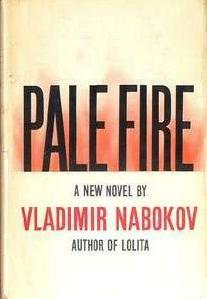
Pale Fire is a 1962 novel by Vladimir Nabokov. The novel is presented as a 999-line poem titled "Pale Fire", written by the fictional poet John Shade, with a foreword, lengthy commentary and index written by Shade's neighbor and academic colleague, Charles Kinbote. Together these elements form a narrative in which both fictional authors are central characters. Nabokov wrote Pale Fire in 1960–61, after the success of Lolita had made him financially independent, allowing him to retire from teaching and return to Europe. Nabokov began writing the novel in Nice and completed it in Montreux, Switzerland.
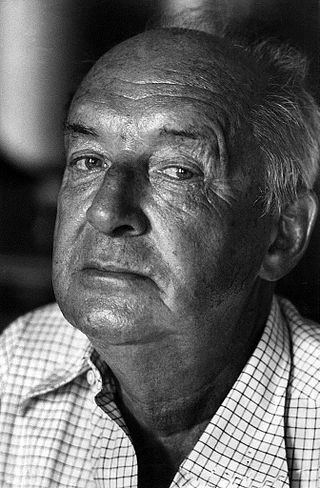
Vladimir Vladimirovich Nabokov, also known by the pen name Vladimir Sirin, was a Russian and American novelist, poet, translator, and entomologist. Born in Imperial Russia in 1899, Nabokov wrote his first nine novels in Russian (1926–1938) while living in Berlin, where he met his wife, Véra Nabokov. He achieved international acclaim and prominence after moving to the United States, where he began writing in English. Nabokov became an American citizen in 1945 and lived mostly on the East Coast before returning to Europe in 1961, where he settled in Montreux, Switzerland.
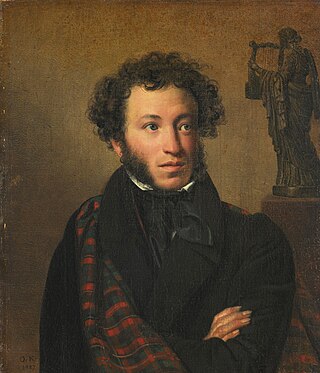
Alexander Sergeyevich Pushkin was a Russian poet, playwright, and novelist of the Romantic era. He is considered by many to be the greatest Russian poet, as well as the founder of modern Russian literature.
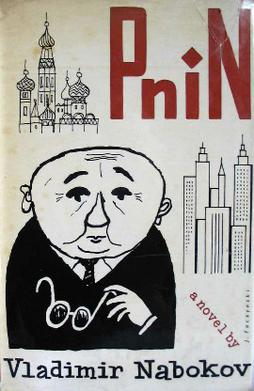
Pnin is Vladimir Nabokov's 13th novel and his fourth written in English; it was published in 1957. The success of Pnin in the United States launched Nabokov's career into literary prominence. Its eponymous protagonist, Timofey Pavlovich Pnin, is a Russian-born assistant professor in his 50s living in the United States, whose character is believed to be based partially on the life of both Nabokov's colleague Marc Szeftel as well as on Nabokov himself. Exiled by the Russian Revolution and what he calls the "Hitler war", Pnin teaches Russian at the fictional Waindell College, loosely inspired by Cornell University and Wellesley College—places where Nabokov himself taught.

Nabokov's Congeries was a collection of work by Vladimir Nabokov published in 1968 and reprinted in 1971 as The Portable Nabokov. It was edited by Page Stegner. Because Nabokov supervised its production less than a decade before he died, it is useful in attempting to identify which works Nabokov considered to be his best, especially among his short stories.
Onegin stanza, sometimes "Pushkin sonnet", refers to the verse form popularized by the Russian poet Alexander Pushkin through his 1825–1832 novel in verse Eugene Onegin. The work was mostly written in verses of iambic tetrameter with the rhyme scheme aBaBccDDeFFeGG, where the lowercase letters represent feminine rhymes and the uppercase representing masculine rhymes. For example, here is the first stanza of Onegin as rendered into English by Charles Johnston:

Brian David Boyd is a professor of literature known primarily as an expert on the life and works of author Vladimir Nabokov and on literature and evolution. He is a University Distinguished Professor in the Department of English at the University of Auckland, New Zealand.
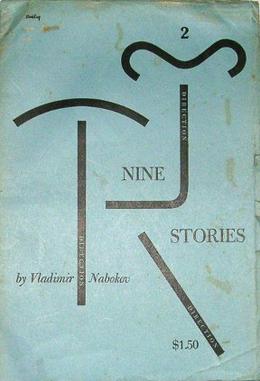
Nine Stories is an English-language collection of stories written in Russian, French, and English by Vladimir Nabokov. It was published in December 1947 by New Directions in New York City, as the second issue of a serial, Direction.
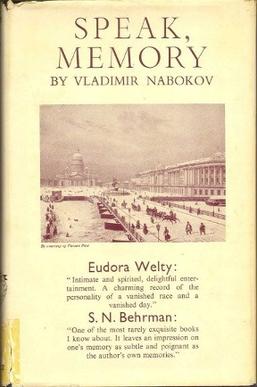
Speak, Memory is a memoir by writer Vladimir Nabokov. The book includes individual essays published between 1936 and 1951 to create the first edition in 1951. Nabokov's revised and extended edition appeared in 1966.
Golden Age of Russian Poetry is the name traditionally applied by philologists to the first half of the 19th century. This characterization was first used by the critic Peter Pletnev in 1824 who dubbed the epoch "the Golden Age of Russian Literature."
"Signs and Symbols" is a short story by Vladimir Nabokov, written in English and first published, May 15, 1948 in The New Yorker and then in Nabokov's Dozen.

The Defense is the third novel written by Vladimir Nabokov after he had immigrated to Berlin. It was first published in Russian 1930 and later in English in 1964.
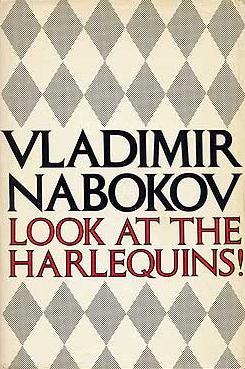
Look at the Harlequins! is a novel written by Vladimir Nabokov, first published in 1974. The work was Nabokov's final published novel before his death in 1977.
"Mademoiselle O" is a memoir by Vladimir Nabokov about his eccentric Swiss-French governess.
"Bachmann" is a short story written in Russian by Vladimir Nabokov under his pen name, Vladimir Sirin, in Berlin in 1924. The story details a three-year love affair between the titular Bachmann, a celebrated pianist, and Mme. Perov, a married woman.
"The Potato Elf" is a short story written in Russian by Vladimir Nabokov in Berlin where it was first published in the émigré daily Rul in 1929 and then included in the 1929 collection Vozvrashchenie Chorba. It was initially translated into English by Serge Bertensen and Irene Kosinska for publication in Esquire in 1939, and reprinted in A Single Voice. Nabokov then retranslated the story and included it in A Russian Beauty and Other Stories in 1973.
"The Return of Chorb" is a short story by Vladimir Nabokov written in Russian under his pen name Vladimir Sirin in Berlin in 1925. In 1929 it became part of a collection of fifteen short stories and twenty-four poems also called The Return of Chorb in Russian by "V. Sirin".
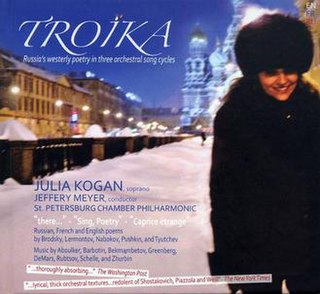
Troika: Russia's westerly poetry in three orchestral song cycles is a 2011 album of contemporary classical songs performed by soprano Julia Kogan, who also conceived the project. She is accompanied by The St. Petersburg Chamber Philharmonic conducted by Jeffery Meyer. The songs are set to Russian, English, and French language poetry by five classic Russian writers: Joseph Brodsky, Mikhail Lermontov, Vladimir Nabokov, Aleksandr Pushkin and Fyodor Tyutchev. Eight modern composers, from France, Russia, and the United States, wrote music for the album: Isabelle Aboulker, Ivan Barbotin, Eskender Bekmambetov, Jay Greenberg, James DeMars, Andrey Rubtsov, Michael Schelle and Lev Zhurbin.
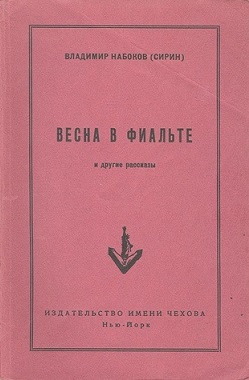
Spring in Fialta and other stories is a collection of short stories by the Russian author Vladimir Nabokov. The collection contains 14 short stories written between 1931 and 1940. It was originally planned to be published in 1939 in Paris; however, due to the approach of World War II, it became an abandoned project.
Eugene Mark Kayden (1886–1977) was a professor emeritus of economics at Sewanee: The University of the South and a translator of Boris Pasternak's poems. Kayden, a pro-integrationist, declined an honorary degree from the university in protest of its decision to award another degree to noted segregationist Thomas R. Waring.












